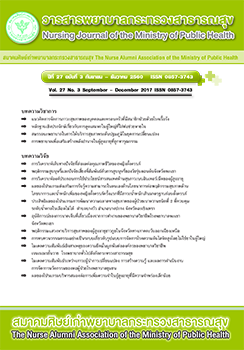The Effectiveness of a Program for Health Literacy Development of the Patients with Uncontrolled Type 2 Diabetes at
Main Article Content
Abstract
Enhancing health literacy is important for the development of appropriate health behaviors among persons with Diabetes Mellitus (DM). A quasi-experimental study using a two-group pre-test and post-test design was conducted to investigate the effects of a program improving health literacy among patients with DM type II and with uncontrolled blood sugar level. The participants were 70 patients with DM who received health services at Bangwua health promotion hospital, Chachoengsao Province. They were equally divided into an experimental and control groups. Research instruments included 1) a program of health literacy development, 2) “Health literacy and diabetes control” handbook, 3) a questionnaire of health literacy, self-efficacy, and self-care behaviors, and 4) a blood glucose monitoring device. Content validity indexes for the questionnaire were .85-1.0, and Cronbach’s alpha coefficients were .84-.96. The data were analyzed using descriptive statistics and t-test comparisons.
The results revealed that after participating in the program, the level of health literacy, self-efficacy related to management, and health behaviors reported by the experimental group was higher than that of the control group at the significance level of 0.01. The blood sugar level of the experimental group was also significantly lower than that of the control group (p<.05). The findings suggest that improving health literacy is a strategy that can help diabetic people acquire appropriate health behaviors, decreasing the severity and unwanted complications due to DM.
Article Details
บทความและรายงานวิจัยในวารสารพยาบาลกระทรวงสาธารณสุข เป็นความคิดเห็นของ ผู้เขียน มิใช่ของคณะผู้จัดทำ และมิใช่ความรับผิดชอบของสมาคมศิษย์เก่าพยาบาลกระทรวงสาธารณสุข ซึ่งสามารถนำไปอ้างอิงได้
References
2. Health Promoting Hospital Bangwua. Results progress for the year 2016. Chachoengsao. (in Thai).
3. Ovatakanont P. The Outcome of Diabetes Care and Factors Associated with Poor Glycemic Control among Type 2 Diabetic Patients in Saimun Hospital. Srinagarind Med J 2011:26(4) [internet].2016[cited 2016 November 12]. Available: http://www.kmutt.ac.th/jif/public_html/article_detail.php?ArticleID=96522
4. Jaisaen W. Systematic Review on Diabetic Control Interventions Among Persons with Diabetes Mellitus Type 2. Master of Nursing Science (Adult Nursing). [Master thesis].Chiangmai: Chiangmai University.2008. (in Thai).
5. Buraphunt R, Muangsom N.Factors Affecting Uncontrolled Type 2 Diabetes Mellitus of Patients in Sangkhom Hospital, Udonthani Province. KKU Journal for Public Health Research Vol.6 No.3 July-September,2013;102-09. (in Thai).
6. Bains & Egede. Associations Between Health Literacy, Diabetes Knowledge, Self-Care Behaviors, and Glycemic Control in a Low In come Population with Type 2 Diabetes. Diabetes Technol Ther. 2011 Mar; 13(3):335341.doi: 10.1089/dia.2010.0160. [in ternet]. 2016 [cited 2016 Aug 11]. Available from:https://www.ncbi.nlm.nih.gov/pmc /articles/PMC3690006/
7. Benzel-Lindley, JA. Exploration of Factors Impacting the Self-Care of Elders with Diabetes.University of Arizona . [internet]. 2016 [cited 2016 August 14]. Available from: http://arizona.openrepository.com/arizona/handle/10150/194364
8. Saeko K. Health literacy among eye surgery patiens. M.Sc. (Public health) major in health education and behavioral science. Mahidol university.2009. (in Thai).
9. Jonas G, Daniel A, Regina M, Alexandre L, Flavia C, & Wilson J. Functional health literacy and glycaemic control in older adults with type
2 diabetes: a cross- sectionalstudy. [internet].2016 [cited 2016 Aug 11]. Available from:http://bmjopen.bmj.com/content/4/2/e004180.full.pdf+html.
10. Rajatanavin R, Ningsanon T.(Editor). Self care when sick.in HimathongkamT. Full knowledge of diabetes. Bangkok : Printing of Vitayapat. 2011. (in Thai).
11. David WB. The Meaning and the Meause of Health Literacy. J Gen Intern Med. 2006 Aug; 21(8): 878–83. doi: 10.1111/j.1525-1497.2006.00540.x Available from: https://www.ncbi.nlm.nih.gov/pmc/articles/PMC1831571
12. Huizinga M, Elasy T, Wallston K, Cavanaugh K, Davis D, Gregory P, … Russell L Rothman. Development and validation of the Diabetes Numeracy Test (DNT). BMC Health Services Research 2008, 8:96 doi:10.1186/1472-6963-8-96 [internet]. 2016 [cited 2016 Aug 22]. Available from: http://www.mc.vanderbilt.edu/documents/CDTR/files/diabetesnumeracy-test-15.pdf
13. Bohanny W, Wu S, Liu C, Yeh S, Tsay S, Wang T. Health literacy, self-efficacy, and self-care behaviors in patients with type 2 diabetes mellitus. Journal of the American Association of Nurse Practitioners. Version of Record online: 4 Mar 2013 | doi: 10.1111/1745-7599.12017(pages 495–502).
14. Ko J, Murry N, Lee J, Baik S, Kim M. Health literacy, diabetes self-care activites, and glycemic control in low-income populations with type2 diabetes. The University of Texas at Austin School of Nursing. [internet]. 2016[cited 2016 Aug 11]. Available from:https://nursing.utexas.edu/chpr/docs/2016/poster/Lee%20Abstract.pdf
15. Rangseesakhon O, Chanchay S, Saowakontha S, Thiramanus T. Factor associated with blood sugar controlling of type 2 diabetic patients at health science center Burapha university, muang district, Chonburi province. Chonburi: Burapha university; 2009. (in Thai).

